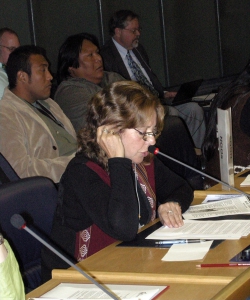21 February 2008, Rome, Italy
This morning many civil society organizations held a peaceful demonstration outside the plenary room here in rome. Two statements were read in the plenary on behalf of many - but not all - civil society organizations present here. One focused on GE trees and agrofuels, and the other reflecting on the process at this SBSTTA. The Statement on GE trees and agrofuels is below, read in the plenary by Ana Filippini from World Rainforest Movement.
I’m speaking on behalf of many civil society organizations and Indigenous organizations present here at SBSTTA.
GE trees are a tremendous threat to forest biodiversity, and to forest dependent and indigenous communities.
This body is not acknowledging this. Instead of strengthening the decision on GE trees made at the last COP, this body is considering weakening the decision, paving the way to commercialize this deadly and destructive technology.
Commercialization of GE trees is moving forward rapidly, driven by pulp and paper and biofuels industries. Use of GE trees will further consolidate a model of monoculture tree plantations that has already resulted in serious social and environmental impacts, in many Southern countries.
The issue of GE trees is closely connected to the issues of agrofuels, climate change and illegal logging, which must also be addressed by this body with the application of the precautionary principle.
The new emphasis on wood to produce agrofuels is creating a massive new demand for wood on top of the already growing demand. This will result in more logging—mostly illegal—and more conversion of forests and other ecosystems to massive monoculture tree plantations of both conventional and GE trees. All of this will have a detrimental impact on the climate.
The destruction of forests takes a high toll, not only on wildlife and biodiversity, but on forest-dependent and indigenous communities and women
A ban on GE trees is critical because of the enormous threat to biodiversity from contamination of forests by GE trees. Researchers have found that tree pollen can travel for over 1,000 kilometers. Addressing GE trees on a case by case basis is inadequate.
Even GE tree researchers acknowledge this threat. In an FAO report on GE trees, researchers named contamination as their second greatest concern about GE trees. Their number one concern was public opinion.
Social movements and environmental organizations around the world are mobilizing against GE trees. In only one week, nearly 150 organizations based in countries where GE tree field trials are occurring signed on to support a global ban against the release of GE trees into the environment.
It is now the time for delegates to acknowledge the concerns of civil society. The decision from COP 8 must be strengthened. There must be a ban on the release of GE trees.
